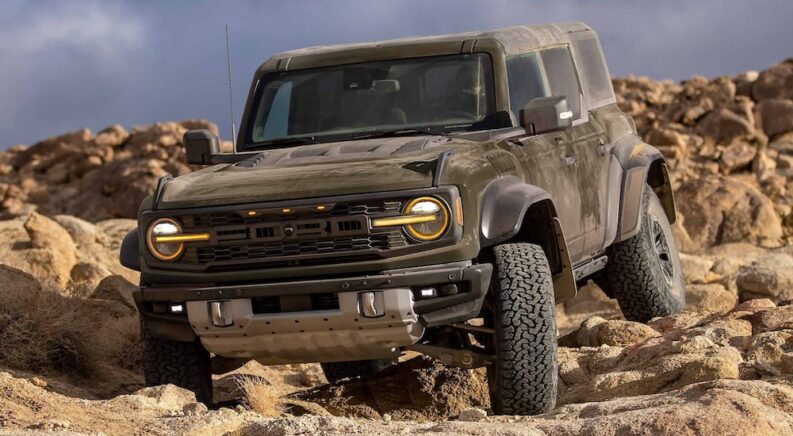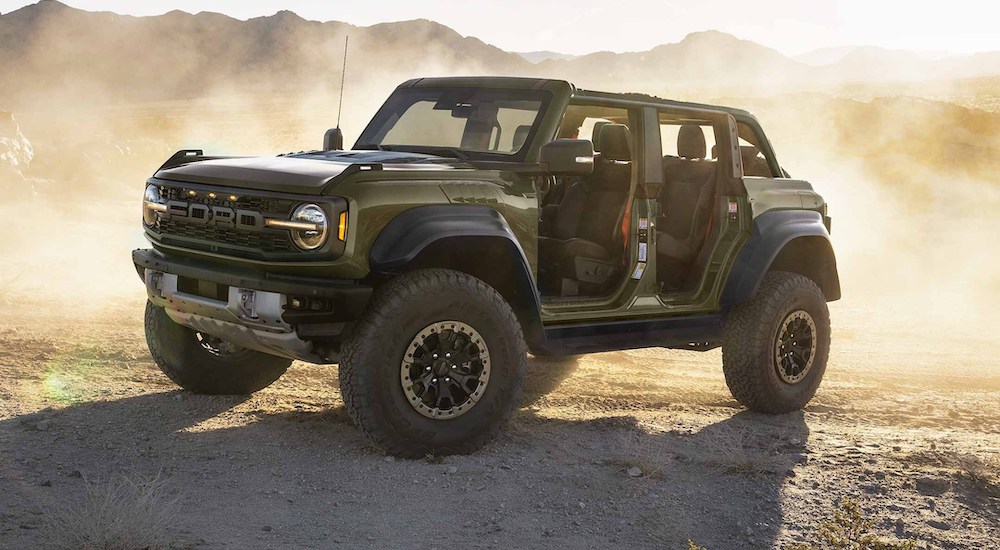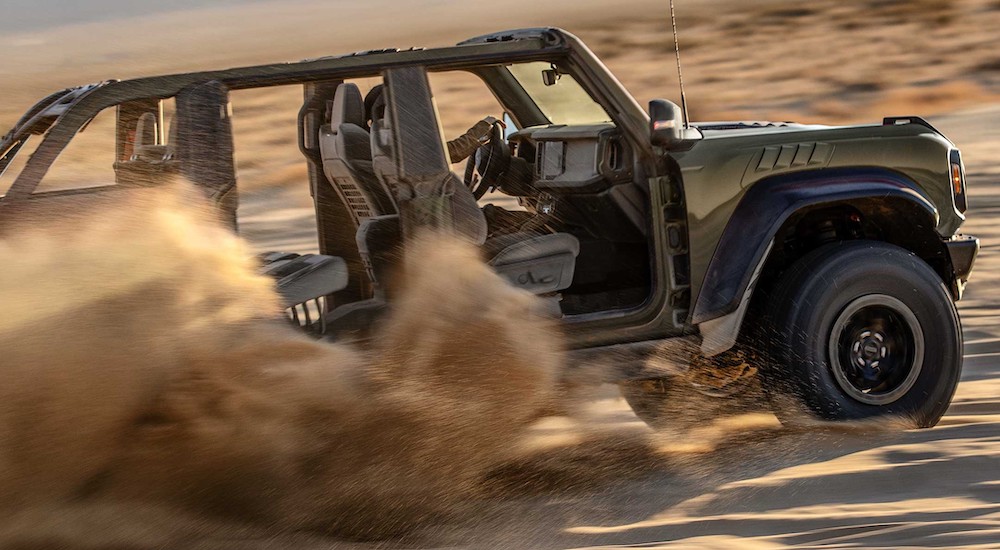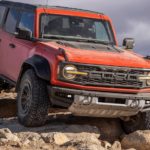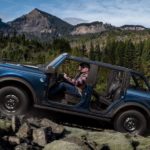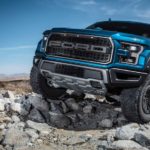You might have heard that the already beloved Raptor trim, previously available on the F-150 truck, is now also available on the off-road-ready Bronco. Many drivers who were already fans of the Bronco are excited for this new rendition, which is inspired by Ultra4 racing vehicles, which are basically vehicles meant to go super fast in off-road environments. If you’re looking into Ford SUVs for sale and want something that can accelerate with the best of them, even on rocky roads, the Ford Bronco Raptor is a really thrilling new option to check out. If you already drove the F-150 Raptor, you know what this trim is all about.
Some off-road enthusiasts are asking whether the Ford Bronco Raptor is better for overlanding or off-roading, and if it’s not right for overlanding, which Ford model is. Since the trend of overlanding has picked up such massive interest in recent years, many drivers are still figuring out which vehicles are right for it. Overlanding won’t require a vehicle quite as rugged as the Bronco Raptor. In fact, the heavy-duty features of the Raptor, while awesome, could actually hold overlanders back. Meanwhile, many overlanding vehicles can’t tackle true off-road environments the way the Bronco Raptor can. Today, we’re going to look at what exactly overlanding is, how it’s different from off-roading, and which Ford vehicles are best for each respective activity.
What Is Overlanding?
Overlanding essentially refers to traveling off of paved roads to get to remote destinations. At first, it sounds a lot like off-roading. However, overlanding contains some limited parts of off-roading, and adds a whole lot more.
The main difference between overlanding and off-roading is that overlanding is about getting to a destination, while off-roading is about the thrill of the drive itself. Off-road enthusiasts might go out to an area they know is filled with uneven, unpredictable, hilly terrain, ride those trails with no particular destination in mind, and go home after getting their fill of thrills.
Overlanding, on the other hand, is done with a destination in mind, usually somewhere far away. You aren’t just going to drive around in a limited area, and then head home. Overlanding can go on for weeks, months, or even years. Since people are living out of their overland vehicles, they often won’t take as many risks as those who are just out for a quick trail hop, intending to push their limits.
How Popular Is Overlanding?
There are online influencers who have made a living documenting their lifestyle as overlanders. Many have monetized YouTube channels and sponsorship deals. They are kind of like the “Van Life” folks, but on figurative steroids. They overland from one destination to the next, setting up camp where they arrive, and then moving onto the next place. In fact, some would say that in order to be a good overlander, you have to have other skills than just driving, such as good camping and hiking skills. You might even need survival skills, and knowledge on how to repair your own vehicle, since you could find yourself far away from any assistance.
Overlanding is more of a means of transportation combined with a way of life. Off-roading is a hobby or activity, not the means to an end like overlanding is. You go somewhere in order to off-road. You go overlanding in order to have an adventurous trip to somewhere.
How Do Overlanding Vehicles Differ From Off-Road Ones?
An overlanding vehicle needs to take you for potentially hundreds, if not thousands of miles, and needs to help you reach specific destinations. It needs to do just as well on paved roads, including freeways and city streets, as it does in off-road environments. For that reason, an overlanding vehicle will have better fuel economy than a true off-road one, and will likely have less aggressive tires suitable for both dirt and pavement.
A vehicle set up for a day of fun on the trail doesn’t have to include a place to sleep or a kitchen. Overlanders, however, need to bring all the necessities of home with them. Rather than a case of water, they might bring many gallons. Overland rigs sometimes have luxuries that we might not expect, such as a solar-powered electrical system, or even a hot shower. None of these are necessary for a quick day trip.
Off-road vehicles are designed mainly for adventure rides in contained areas, so they don’t really need great fuel economy. They also won’t be your everyday vehicle, so they can have massive all-terrain tires even though, with their deep treads, they wear down quickly on paved roads and are obnoxiously loud. They’re great for sand dunes and boulder-littered grounds, not for the suburbs.
Which Ford Vehicle Is Right for Which Pastime?
When it comes to off-roading, the Bronco Raptor is the way to go. It has massive 37-inch all-terrain tires with deep treads that will push dirt and snow out of the way while you tackle all sorts of terrain. It also has astonishingly good suspension travel, which is how far a wheel can go up and down, and a powerful engine. It also has voice-activated navigation, which is helpful when you’re driving over rocky terrain and must keep your hands firmly on the wheel.
The best Ford overlanding vehicle has to be the Ranger, for many reasons. First of all, it’s a pickup truck, and you’ll need a pickup bed to transport all of the things you need to overland, like a tent, cooler, equipment, tools, and more. The Ford Ranger also has all-season tires, which are good for both mild off-road environments and regular paved roads. When your overlanding adventure requires you to take the freeway for a while, you can. If you need to go over slightly rough roads, you can do that, too.
The Ranger also gets good fuel economy. Overlanding is about going far, so you want to save on gas if you can. Finally, the Ranger can tow 3,000 more pounds (7,500 in total) than the Bronco Raptor, so it can tow a good-sized camper. Between its truck bed and better towing capacity, the Ranger is far better equipped than the Bronco Raptor to help bring all the things you might need to live away from home for weeks or months at a time.
Are You an Overlander or an Off-Roader?
This article might have made you rethink your entire identity as a driver. There is a lot of buzz around the overlanding vs. off-roading topic. Some people mistake the two for each other, and people deeply involved in either scene get offended by that. Overlanders like to remind you that they get out of their vehicles and interact with nature. They camp. They hike. They build fires and fish. Off-roaders want people to understand that their vehicles are much, much more rugged than those of an overlander.
If you were interested in an off-road vehicle because of its ability to get you to far-off destinations while skipping paved roads, you might actually be an overlander. If you just want to go somewhere hilly and bumpy and drive around until you’re ready for a break (and you want to sleep indoors with running water), you’re probably an off-roader. Each activity requires a vehicle with specific features, and it’s important to understand the differences.

